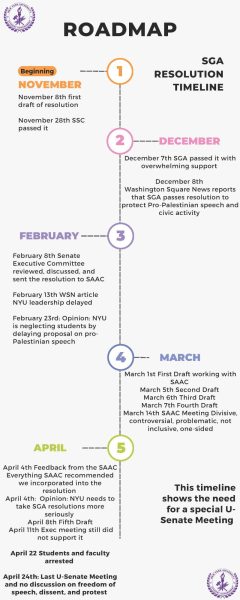Guest essays reflect opinions from writers beyond WSN. If you’d like to submit a guest essay for consideration, please email [email protected].
How many more conversations will it take before NYU and President Linda Mills truly listen to pro-Palestinian voices? NYU students have been facing suppression, harassment, intimidation, suspensions and retaliation simply for expressing views in support of Palestine. Currently, the lack of consistency and transparency in policies leaves students engaging in peaceful protests and other forms of expression in a vulnerable position, as evidenced by the 160 conduct hearings. Because of this, on Dec. 7, the Student Government Assembly passed the Resolution to Reaffirm Pro-Palestinian Speech and Civic Activity, demanding that the university protect pro-Palestinian students’ rights to free expression and for greater transparency and clarity on what protected dissent looks like on campus. The resolution was passed through SGA with overwhelming support.
Historically, SGA resolutions have rarely reached the University Senate floor, the highest deliberative body at NYU with deans, students, administrators and faculty, and resolutions are often deferred to committees and blocked by the wheels of bureaucracy. Thus, history indicated to us that this resolution was likely dead on arrival. Despite this, SGA came to the table in good faith even after the University Senate Executive Committee made the decision to send the resolution to the University Senate Academic Affairs Committee, rather than presenting it on the University Senate floor at the March meeting.
It is highly disconcerting to see the feedback that this resolution has received. When the resolution was pushed over to SAAC, I, as the sponsor, decided to make the compromise to give the resolution the best fighting chance. It was recommended to me that I cut the history, context and examples related to the suppression on campus so that the resolution would appear less divisive and emotional. A voting member of the Senate Executive Committee has staunchly expressed his opinion on the resolution by using the phrase, “loaded with emotion and presented a heated shotgun approach to what some of our students believe is an injustice,” and describing the assault on Gaza as the “Middle East conflict.” This language is unacceptable and especially insensitive given the context of the situation and dismisses the assault on Gaza by Israel that has resulted in nearly 35,000 Palestinians killed.
I was also told it was best to remove the word Palestine from the title of this resolution to have the best chance for it to be passed. Determined to have the resolution move forward, I ultimately made these compromises, as long as the message of the resolution could stay that pro-Palestinian students at NYU had the right to express themselves. What resulted is this edited version of the resolution that was shortened from 10 to two pages, titled Resolution Reaffirming Academic Freedom on Campus.
Even this edited resolution was criticized, especially for writing, “in light of suppression, harassment, intimidation, suspensions and retaliation from NYU towards students for engaging in pro-Palestinian civic activities and speech reflecting pro-Palestinian views…” The committee considered this line controversial and divisive and recommended that I remove this line, which essentially is denying students’ realities. Once again, I edited the language to instead state, “multiple students have been doxxed, harassed and have faced retaliation.” The stripping of this language detracts from the experiences that students face every day. I removed everything besides mentioning Palestine twice and, yet, that was still controversial.

Throughout this entire process, I have worked with the university to make edits to this resolution so that the very basic demand of the acknowledgment of the assault on Gaza and transparency surrounding academic freedom and dissent could be met. Despite all these efforts and engaging in good faith with the university, the Senate Executive Committee decided that the resolution was still too divisive for discussion at the University Senate. Their reasons were that the conversation would be uncontrollable and bad for the community. That the University Senate, a body made up of elected students, faculty and administrators, could not manage it. If this body cannot have tense and sensitive conversations, then where can we have them on campus?
Academic freedom, is not a selective privilege and must be extended to everyone within NYU and cannot be achieved with the suppression of civic activity and dissent. With the University Senate, we have the means to open this critical dialogue that impacts the entire NYU community. Especially with NYU’s current aim to promote open dialogue, this resolution acts as an opportunity to provide just that. Instead, the Senate Executive Committee shied away from this important dialogue and worked to what frankly seems like waiting out on the clock on this resolution.
NYU has a reckoning to grapple with when it comes to its Palestinian students. Once again, instead of listening to its students, the university decided to call the New York City Police Department on peaceful protestors calling attention to the horrific incidents happening in Gaza and the complicity that NYU has. We have watched the NYPD brutally attack and arrest Muslim students while they were peacefully praying. If saying the word Palestine is too controversial, then NYU is lacking as a global institution. Regardless of whether or not President Mills is ready to listen to students or for NYU to live up to its reputation as a global institution, this school is accountable to its students. As the chant goes, “The students united will never be defeated.”
WSN’s Opinion section strives to publish ideas worth discussing. The views presented in the Opinion section are solely the views of the writer.
Contact Lamisa Khan at [email protected].


























































































































































